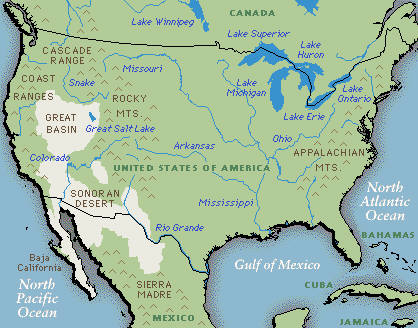

History 1700 MacKay
Manifest Destiny
Land Takings | The
West -- New interpretations
readings: Oates, Part One: 13; Internet sites
(become familiar with LaFaber's argument, the notion of
Manifest Destiny, and at least 2 major land takings, 1803-1850)
U.S. Territorial Maps, 1775-1920: http://xroads.virginia.edu/~MAP/terr_hp.html
History of U.S. Territorial Acquisitions: http://www.phil-am-war.org/territorial.htm
John L. O'Sullivan's 1839 essay defining Manifest Destiny: http://www.mtholyoke.edu/acad/intrel/osulliva.htm
From PBS, a site with scholars discussing Manifest Destiny: http://www.pbs.org/kera/usmexicanwar/dialogues/prelude/manifest/manifestdestiny.html
Paris Peace Treaty of 1783: http://www.ukans.edu/carrie/docs/texts/paris_treaty.html
Efforts to take Northwest Territory lands from the Indians: http://www.ohiokids.org/ohc/history/h_indian/periods/nwterrit.html
Northwest Ordinances: http://www.britannica.com/eb/article?eu=57694
Louisiana Purchase, 1803, including links to laws establishing governance: http://www.yale.edu/lawweb/avalon/diplomacy/fr1803m.htm
War of 1812: http://www.militaryheritage.com/1812.htm
Also: http://www.multied.com/1812/
Treaty of Ghent: http://odur.let.rug.nl/~usa/H/1990/ch3_p11.htm
John Quincy Adams' as Secretary of State
Convention of 1818 and joint occupation of Oregon: http://www.historylink.org/output.CFM?file_ID=1740&keyword=Roots
Adams-Onis Treaty (1819) : http://www.pbs.org/kpbs/theborder/history/timeline/2.html
1819 purchase of Florida as extension of Louisiana Purchase issues: http://www.robinsonresearch.com/THE_U_S/HISTORY/PART-III/LaPurchase.htm
Texas, 1836-1845
From the Texas state archives a brief description of the Texas Republic: http://www.tsl.state.tx.us/treasures/republic/
A gallery of images related to the 150 year celebration of annexation: http://www.humanities-interactive.org/texas/annexation/angallery.htm
Treaty of Oregon, 1846: http://www.historylink.org/output.cfm?file_id=1745
Another site (the date of the Oregon Boundary treaty is 1846): http://lisapeppan.tripod.com/1etreaty.html
The Mexican War, 1846-1848: http://www.dmwv.org/mexwar/mexwar.htm
A short encyclopedic summary of the war: http://www.encyclopedia.com/articles/08402.html
Information from the PBS Series on the Mexican War: http://www.pbs.org/kera/usmexicanwar/
Treaty of Guadalupe Hidalgo: http://www.loc.gov/exhibits/ghtreaty/
Indian Wars:
A short summary of wars through 1876: http://www.gbso.net/skyhawk/indianwa.htm
A selection of documents related to the Indian Wars: http://www.hillsdale.edu/academics/history/Documents/War/19Ind.htm
Short summaries from the Electric Library Encyclopedia: http://www.encyclopedia.com/articlesnew/06329.html
(become familiar with the New Western history which includes women and which argues for the significance of the West as a region of federal influence)
readings: Oates, Part One: 22
An excellent summary and definition of the "cult of domesticity" which was created in the mid-1800s is at: http://www.library.csi.cuny.edu/dept/history/lavender/386/truewoman.html
a number of links to sites about everyday life on the Overland Trail, including a link to Goodey's Lady's Book, the most significant of the magazines promoting the "new womanhood" developed in the mid-1800s: http://www.over-land.com/trdailylife.html
readings: Oates, Part Three: 4
Frederick Jackson Turner, "Significance of the West," http://www.nv.cc.va.us/home/nvsageh/Hist122/Part1/TurnerFT.html
A helpful set of questions about the Turner's thesis: http://www.library.csi.cuny.edu/dept/americanstudies/lavender/frontier.html
And from the PBS series on the West, short biographies of:
Buffalo Bill Cody: http://www.pbs.org/weta/thewest/people/a_c/buffalobill.htm
Theodore Roosevelt: http://www.pbs.org/weta/thewest/people/i_r/roosevelt.htm
See Frederick Remington's Illustrations: http://xroads.virginia.edu/~HYPER/OREGON/rem_toc.html
Short discussion of Owen Wister's literary West: http://history.acusd.edu/gen/west/wister.html
New Western historians have abandoned the concept of the frontier as a process, and think of it in terms of place and relationships. The West is characterized by a set of relationships that distinguish it from other sections of the country--the region's relationship with the federal government; a dual labor system based on race and the existence of minority groups with distinctive legal status; patterns of political participation and political organization. Together, these relationships among people, and between people and place, have combined to make the West a distinctive region.
Academic Info has a set of links about the new Western History: http://www.academicinfo.net/westnew.html
West Web is a huge site of links on the West: http://www.library.csi.cuny.edu/westweb/